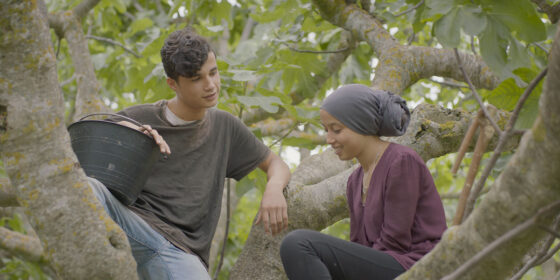TIFF 2022 | Under the Fig Trees (Erige Sehiri, Tunisia/France/Switzerland/Germany/Qatar) — Contemporary World Cinema

By Michael Sicinski
The feature debut of documentarian Erige Sehiri (Railway Men) is a perfectly agreeable film: it has screened at a number of festivals since premiering in the Quinzaine, and will probably end up playing to many appreciative audiences in the future, even as it remains rather schematic in its organization. Set during a single workday of the fig harvest, Under the Fig Trees has one rather unusual conceit: aside from brief moments shown arriving at and departing from the field, the entire film takes place within the orchard. As Brecht always observed, pairing a dramatic performance with some routinized action helps actors concentrate and mitigates their tics and habits. In this case, we see the performers climbing trees, packing crates, or using crooks to gently pull high branches down without breaking them, and this helps Sehiri elicit solid performances from the entire cast.
What is odd, though, is that while Under the Fig Trees appears to be intimately connected to its single location, one could easily imagine this work reimagined for the stage. Co-written with frequent Abdellatif Kechiche collaborator Ghalya Lacroix, Fig Trees operates on a well-worn principle—a group of people gathered in one place are going to experience character-based conflict—and a careful viewer will keep a mental list of Sehiri’s narrative manoeuvres and note how absolutely she ticks all the boxes. There are pointed contrasts between young and old, men and women, bosses and employees. There are conservative and liberal Muslims, who disagree about romantic love, eros and agape, and wearing hijabs versus doing duck-faces on Insta.
Every subplot receives such equal treatment that the content feels measured out in tablespoons. This certainly makes Fig Trees an easy watch, but its familiarity eventually breeds a relative lack of interest, even as there are moments that hint at a more compelling film lurking beneath the surface. One of the most interesting exchanges takes place between Fidé (Fidé Fdhili) and one of the older men in the crew: after Fidé exclaims that there are no real men in Tunisia anymore, he scolds her, noting that his generation was strong enough to expel the French. “Women fought too, don’t forget that,” she replies. If there is a single primary theme in Under the Fig Trees, it’s that a new generation of Tunisian women are willing to stand up for themselves, something that even the matriarchs seem ambivalent about. In the final scene, as the women sing and ululate, Sehiri pans over the grim faces of the senior citizens. They feel bad for the young people, who have yet to discover that life is pain.
Michael Sicinski

